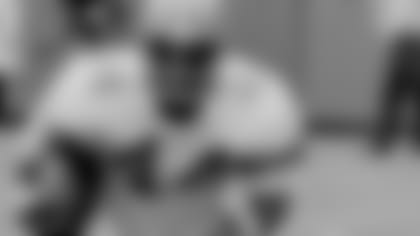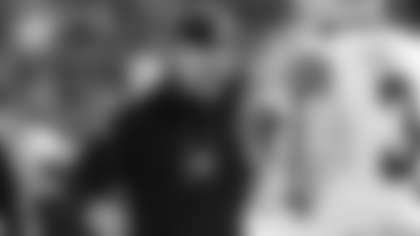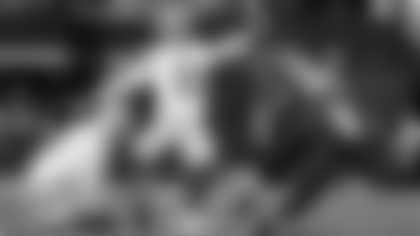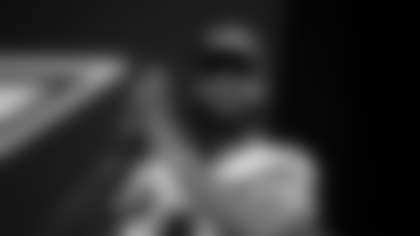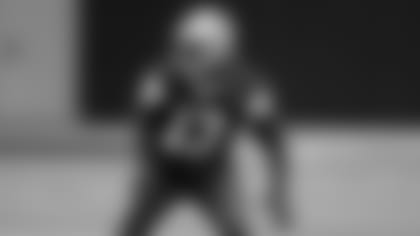The introduction came quickly, or maybe it didn't. Maybe it was just the shock. I looked up from my desk, standing up in the process, expecting to see a Greek God, or as some called him, the "Human Bowling Ball."
This was Robert Newhouse, the man with bigger thighs than Earl Campbell, some 44 inches, a mind-blowing measurement. The man who blocked for Calvin Hill and Tony Dorsett, the man who scored the first touchdown in the history of Giants Stadium, the first running back to throw a touchdown in the Super Bowl. This was a football legend, one who played all of his 168 NFL games with the Dallas Cowboys from 1972-83. This was one of the men who sacrificed himself on the field, and in the process, created America's Team, a nickname which was bestowed on the Cowboys in 1979.
This was going to be one of those handshakes that would leave my fingers numb for hours. And then I saw him, standing in the doorway of my office. This frail little man, just 62 years old at the time, yet he looked so much older. Almost as if he was fading away. And I guess, looking back, he was. He couldn't have been more than 150 pounds, some 18 months removed from suffering a stroke.
On Tuesday, after a lengthy battle with heart disease, Newhouse passed away at the Mayo Clinic in Rochester, Minn., surrounded by his wife, Nancy, and four children. He was 64.
Newhouse is one of those rare people in life that everyone liked. After a record-setting collegiate career at Houston – his 1,757 rushing yards in 1971 is still a school mark – the Cowboys selected Newhouse in the second round, 35th overall, of the 1972 NFL Draft. Used primarily as a fullback, he played his entire 12-year career with Dallas, rushing for 4,784 yards, which ranks fifth in franchise history, and catching 120 passes. Newhouse also made history in Super Bowl XII with his pass against the Denver Broncos, across his body no less, running to his left, a 29-yard scoring strike to Golden Richards.
"When Tom called the play, I said, "I can't believe he called this play," Newhouse said after the game. "I was nervous about throwing the ball. In practice,
the ball had been wobbling, but Danny (White) told me to get my hip around it. I kept thinking about that when I got the ball."
Making life more difficult for Newhouse was the fact he had recently doused his hands with Stickum, which was typical in this era before gloves were commonplace. However, when throwing the pigskin, the glue-like substance could prove most problematic for obvious reasons.
"I was shocked. I panicked," Newhouse said. "I've never eaten so much stickum in my life. I started wiping it off my pants and started licking my fingers."
After his playing career, Newhouse worked for the Cowboys until 2008, mostly as the team's director of alumni relations. When Hall of Fame wide receiver Bob Hayes passed away in 2002, it was Newhouse who organized a group of players to travel to Jacksonville for the funeral. He was always making sure things like that were taken care of.
When Tony Dorsett joined the Cowboys as a rookie in 1977, it was Newhouse who served as a mentor, teaching him the playbook, the schemes and perhaps most importantly, how to deal with Tom Landry. That first season wasn't an easy one for Dorsett, who wasn't even starting after winning the Heisman Trophy the year before at Pitt.
"I am honestly not sure how that first season or even my career would have turned out without Robert. I think about that often," Dorsett said, pausing on several occasions to fight his emotions. "Coach Landry's system was so different from what I was accustomed to. Robert just told me to have patience, both as a running back in the system and in dealing with Coach Landry. [embedded_ad]
"I'm guessing a day didn't go by that first season without me running to him, 'Robert, Robert, Robert, what do I do?' He'd just smile and say, 'You'll figure it out. We'll figure it out together.'"
Dorsett ended up cracking the starting lineup by season's end and winning NFL Offensive Rookie of the Year honors, rushing for 1,007 yards. Thing is, the previous two seasons, before Dorsett's arrival, Newhouse rushed for 1,380 yards combined, easily tops on the team. There was never any animosity, though. Newhouse just wanted what was best for the Cowboys.
"In nearly 60 years of being around the NFL, Robert is one of the best people I've ever been around," former Cowboys personnel director Gil Brandt said. "He did everything you asked.
"Let me tell you, don't ever ask a tailback to become a fullback. That's the cardinal sin of football right there. We would alternate Robert back and forth, and he never complained. Not once. Imagine going from being our leading rusher, almost 1,000 yards in 1975, and then being the lead blocker the next few seasons. Who does that? Robert did. He was the very definition of a team player. He loved his teammates so much.
"There was nothing in Robert's makeup to dislike the guy. Nothing. There aren't many like him in this world."
Even though Newhouse's health had been failing for several years now, and he had been in the Mayo Clinic since last November, his former teammates were holding out hope for a miracle. Dorsett spoke with his longtime backfield mate just a few weeks ago on the phone.
"His son, Rodd, called and handed me the phone," Dorsett said. "He sounded so weak, so we didn't talk much. I told him he was our big, strong man, and he was going to beat this. I told him I loved him.
"I knew he wasn't doing well, I understood that, but he was 64. Man, that's young, too young. Robert Newhouse was supposed to live a long time, grow old with us. I just never expected this. I'm so, so sorry for his family. He was such a wonderful man, a great father, a great husband.
"Robert was our peacemaker. If I ever heard him raise his voice, it wasn't more than a few times. We were of the same mind on the field. We were always thinking each other's thoughts. We could just look at each other and we understood. He was such a blessing to me, as a teammate and one of my great friends. Robert just wanted to care of everyone. He was that kind of guy.
"The Lord works in mysterious ways, I'm not sure sometimes why this sort of thing happens. I'm just not sure … but, you know, Robert's home now. And he's nice and healthy again. Maybe he's playing some football. He's Robert again."
* *
Follow Jeff Sullivan on Twitter, @SullyBaldHead, or email him at jsullivan@dallascowboys.net.



